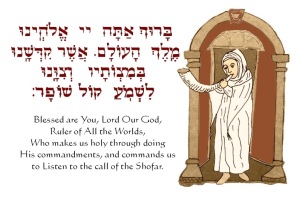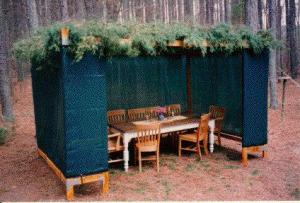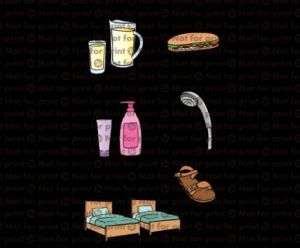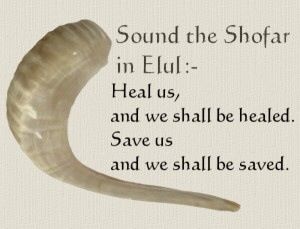 In traditional Judaism the Shofar is not blown when Rosh HaShanah falls on Shabbos. Some Messianics are of the opinion that this rule is based on the rabbinic prohibition to play an instrument of music on Shabbos. FFOZ author Daniel Lancaster, for example, in his book Restoration, expresses this opinion when he says (p. 144):
In traditional Judaism the Shofar is not blown when Rosh HaShanah falls on Shabbos. Some Messianics are of the opinion that this rule is based on the rabbinic prohibition to play an instrument of music on Shabbos. FFOZ author Daniel Lancaster, for example, in his book Restoration, expresses this opinion when he says (p. 144):
«Yeshua asked the Pharisees, “Why do you break the commandments of God for the sake of your tradition?” (Mark 7:8). The guiding principle we learn here is that the written Torah (the Word of God) always trumps the oral Torah (the traditions of men). If a certain tradition or stringency contradicts Scripture, we must discard it.
For example, the oral Torah forbids playing musical instruments on the Sabbath. However, the written Torah commands the blowing of trumpets on the Feast of Trumpets. In traditional Judaism, when the Feast of Trumpets falls on a Sabbath, the trumpets are not blown. Thus the commandment of God (to blow a trumpet on the Feast of Trumpets) has been broken for the sake of a tradition (to not play a musical instrument on the Sabbath).» [1]
The problem with this opinion of Lancaster is not the principle that the Written Torah should overrule traditions which contradict it. As Messianics we all agree with this. The problem is that the prohibition of blowing the Shofar on Shabbos is not derived from the halachic ruling of not playing a musical instrument on Shabbos. This can be easily detected from the fact that the rabbinic prohibition of playing musical instruments not only applies to Shabbos. It also applies to the Yamim-Tovim. Thus, if the blowing of the Shofar should be left aside because of this prohibition, then it would equally apply if Rosh HaShanah occurred on a weekday. But it is clear that the prohibition of blowing the Shofar is not in force when Rosh HaShanah occurs on a weekday. If the Yom-Tov of Rosh HaShanah falls on a weekday the Shofar is blown. To base the prohibition of blowing on Shabbos on the halachah of not playing a musical instrument on Shabbos and Yom-Tov would lead to the absurd conclusion that the Shofar can never be blown at all, for the Day of Rosh HaShanah is always a Yom-Tov. [2] The reasons for the traditional prohibition of blowing the Shofar on Shabbos must therefore be sought elsewhere.
We’ll examine these reasons here below, and try to answer the question whether they are sufficient to justify the prohibition, and how they are related to the traditional two-day observance of Rosh HaShanah.
We find this prohibition mentioned in the Mishnah (Rosh HaShanah 29b): «If the festive day of New Year fell on a Sabbath, they used to blow the Shofar in the Temple but not in the country». The Yerushalmi and the Bavli disagree on the derivation of this law. The Yerushalmi favours the opinion that it is derived from Scripture, while the Bavli concludes that it is based on a decree of the Sages.
The opinion of the Yerushalmi is based on interpretations of Lev. 23:24-25 and Num. 29:1. We’ll consider these interpretations briefly. In Lev. 23:24-25 we find:
«Speak unto the children of Israel, saying, In the seventh month, in the first day of the month, shall be a solemn rest unto you, a memorial of blowing of trumpets, an holy convocation. Ye shall do no manner of servile work therein: but ye shall offer an offering made by fire unto HaShem.»
In Num. 29:1 we find:
«And in the seventh month, on the first day of the month, ye shall have an holy convocation; ye shall do no servile work: it is a day of blowing the trumpets unto you.»
The Yerushalmi notices the difference between Lev. 23:24, which reads “a memorial of blowing”, and Num. 29:1, which reads “a day of blowing”. It concludes:
«One verse says a day of blowing [the Shofar] […] while another verse says a remembrance of blowing [the Shofar] […]. How so? When [Rosh HaShanah] falls on a weekday, it is a day of blowing; when it falls on Shabbos, it is a remembrance of blowing — i.e. [the Shofar] is mentioned, but not blown.»
In his The Festivals in Halachah Rav Zevin adds to this (vol. I, p. 128):
«In the Beis HaMikdash, however, the Shofar is blown even on Shabbos, because it is said: “ ‘And you shall offer up…’ — [i.e. this applies] in the place where the sacrifices are offered up” […]. Pnei Moshe explains that immediately after the verse about A day of blowing [the Shofar] (yom teruah) it is written, And you shall make a burnt offering […] (Num. 29:2) — to tell us that in the place where the sacrifices were offered up it is a day of blowing [the Shofar], even on Shabbos.» [3]
The opinion of the Yerushalmi is also found in the Sifra, which bases itself on Lev. 25:9: «Then you shall cause the Shofar of the Jubilee to sound on the tenth day of the seventh month, in the Day of Atonement shall ye make the Shofar sound throughout all your land». The Sifra reasons that since the Torah says “in the Day of Atonement” we already know that it is the tenth of the seventh month which is meant. And it interprets the verse as saying that in the tenth of the seventh month the blowing of the Shofar supersedes Shabbos “throughout all your land”, thereby implying that on Rosh HaShanah the blowing of the Shofar doesn’t supersede Shabbos “throughout all your land” [but in the place of a Beit Din only]. [4]
The Bavli rejects the suggestion that the prohibition against blowing the Shofar on Shabbos can be deduced from Scripture. The Gemara says:
«Whence [in the Scripture] is this rule derived? — R. Levi b. Lahma said: One verse says, a solemn rest, a memorial of blast of horns, while another verse says, it is a day of blowing the horn unto you! [Yet] there is no contradiction, as one refers to a festival which falls on Sabbath and the other to a festival which falls on a weekday. Raba said: If the prohibition [on Sabbath] is from the Written Law, how comes the Shofar to be blown in the Temple? And besides, [the blowing] is no work that a text should be needed to except it. For it was taught in the school in the school of Samuel: [When it says], Ye shall do no servile work [on New Year], this excludes the blowing of the Shofar and the taking of bread from the oven, these being kinds of skill and not work! — No, said Raba. According to the Written Law it is allowed, and it is the Rabbis who prohibited it as a precaution, as stated by Rabbah; for Rabbah said, All are under obligation to blow the Shofar but not all are skilled in the blowing of the Shofar. [Hence] there is a danger that perhaps one will take it in his hand [on the Sabbath] and go to an expert to learn and carry it four cubits in public domain. The same reason applies to the Lulab and the same reason to the Megillah.» [5]
From the fact that the standard halachah of our days follows the conclusion reached by the Bavli, one can infer that the basic reason for not allowing the Shofar to be blown on Shabbos is contained in the words of the Gemara: “…and carry it four cubits in public domain”. Carrying is one of the main categories of forbidden labours on Shabbos mentioned in the Mishnah. [6]
Perhaps the most important question raised by this halachic ruling is why it should be considered prohibited to carry a Shofar to Shul for the sake of fulfilling the mitzvah of blowing it, while at the same time it should be considered permitted to carry the circumcision utensils to Shul — or a private home — for the sake of fulfilling the mitzvah of bris milah for a new-born Jew. R. Zevin asks: «The mitzvah of Shofar is postponed, lest one carry the Shofar; why is the mitzvah of bris milah not postponed, lest one carry the knife?» [7] He mentions two answers to this question. The first one is from Rabbi Nissim of Gerona (often referred to as the Ran):
«One solution explains that with bris milah the danger of forgetting applies only to the individual who happens to be obligated by the mitzvah on that Shabbos, and if he forgets, others will remind him. But concerning the Shofar the Sages prefaced their gezerah by saying, “All are obligated to blow the Shofar…” meaning that there is no one to remind any particular individual, since all are preoccupied with the mitzvah.»
The “danger of forgetting” is signifying here the danger of forgetting the special sanctity which belongs to Shabbos over and above the sanctity of the Yom-Tov coinciding with it. As Rav Yosef Tzvi Rimon, recalling an explanation afforded by Rav Blumenzweig, puts it:
«Yom Tov is a more active day than Shabbat, and generally when Yom Tov falls out on Shabbat, owing to all the special mitzvot of the holiday, and because of the special prayers, Shabbat is liable to be forgotten. For this reason, there is concern that a person might forget that today is also Shabbat, and therefore act in accordance with the laws of Yom Tov.» [8]
In case of a circumcision only one person is occupied with the mitzvah, and others are there to remind him of the sanctity of Shabbos. But in case of the Shofar sounding on Rosh HaShanah it is feared that nobody will remind another because all are occupied with the special mitzvot of the day. It was probably for this reason that it was decided by the Sages that the Shofar should not be blown on Shabbos.
For the validity of this explanation is required the validity of the presupposition inherent in it, i.e. that occasionally a positive biblical mitzvah can be overruled by a rabbinical precautionary enactment. It is questionable, from a messianic viewpoint, which has a very high regard of the authority of Scripture, whether this presupposition is acceptable.
The second explanation mentioned by R. Zevin is a very interesting one, and it is based on calendrical considerations:
«Furthermore, with the Shofar a second factor is added to the problem of “lest one carry”, which is not applicable to the bris milah; namely, the fact that people are not expert in the determination of Rosh Chodesh, the beginning of the month. [Thus, with Rosh HaShanah, to the risk that one may forget not to carry is added the risk that there may be a miscalculation of Rosh Chodesh, so that on the Shabbos when people think it is Rosh HaShanah, it may not be, and there may be no mitzvah of blowing the Shofar at all. — Ed.]» [9]
Because it is uncertain, according to this line of thought, whether the proclaimed or calculated beginning of the month actually coincides with the visible appearance of the new moon — which allegedly determines the month’s beginning — it could be that from the divine perspective of HaShem the day of Rosh HaShanah was actually on the second day (Sunday) and not on the first day (Shabbos). If this were so, then the carrying performed on Shabbos would imply a transgression of Shabbos punishable by kares because there was no mitzvah of blowing at all.
From an orthodox halachic viewpoint this is, I think, a valid, although perhaps not decisive, argument for abstaining from blowing the Shofar or shaking the Lulav on Shabbos. And this fits nicely with the different ruling in case of a bris on Shabbos. For in the case of a bris there is no uncertainty about the exact day it must be performed. So the halachah seems to be that the prohibition of carrying on Shabbos can be escaped if a mitzvah must be performed on exactly this day — e.g. an eight day circumcision — but that it cannot be escaped in cases when the exact day is not Shabbos or when there is the possibility of a calendrical uncertainty.
This explanation recalls to mind the whole fence law system of Yom-Tov Sheni. Traditional Judaism has adopted the practice to add an additional day to each of the Yamim Tovim, except Yom Kippur, for the communities living in the diaspora, because of an uncertainty in the calendar about the appearance of the new moon. The rule of observing a second Yom-Tov day originates from times when Jewish communities distant from Jerusalem often did not know which day had been declared Rosh Chodesh by the Sanhedrin. The duration of a synodical month is nearby 29½ days, which necessitates a calendar that regulates its months by the moon to alternate between months of 29 and 30 days to keep in tune with the cycle described by the heavenly body. Communities far away from the Holy Land in times of bad communication means often were unable to know whether the 30th or the 31st day after the previous new moon had been declared Rosh Chodesh. Thus, if the new month was a month in which there happened to be Yamim-Tovim — e.g. the months Nisan and Tishri — the only solution was to keep a two day Yom-Tov. After some time this practice was established as a halachic rule for all the diaspora.
Nowadays, when we have a fixed calendar based on calculation, the rule of observing a second Yom-Tov day is no longer strictly necessary because we no longer suffer from these calendrical uncertainties. In orthodox Judaism the rule is retained, though, because of the principle that we should not change the tradition of our forefathers. There can be adduced a number of reasons why Messianics should be reluctant to adopt the observance of Yom-Tov Sheni, and I have already mentioned a couple of them in my article on it. [10] The halachah of Yom-Tov Sheni is to a certain extent rooted in the problems surrounding the determination of Rosh Chodesh Tishri. So we have first to analyze what is going on in this halachah and after that to return to our question about blowing the Shofar on Shabbos.
In the particular case of Rosh HaShanah, more is at stake than a calendrical uncertainty. This can be shown from the fact that the second day of the New Year is not just a diaspora peculiarity; it is kept in Eretz Yisrael too. This fact is not related to the pure external uncertainty about which day had been declared Rosh Chodesh, as was the case in the Yom-Tov Sheni regulation for the diaspora. It was another and inherent uncertainty of the traditional calendar that was the cause of the addition of a second day to the festival. This inherent uncertainty was wrapped up in the method used for determining the new moon.
(To be continued)
___________________
[1] D. Thomas Lancaster, Restoration: Returning the Torah of God to the Disciples of Jesus, First Fruits of Zion — Littleton, Colorado 2005.
[2] Zevin, vol. I, p. 131: «Rosh HaShanah, though it is only sometimes on Shabbos, is always Yom-Tov, and the gezerah “lest one repair the instrument” applies equally to both Shabbos and Yom-Tov. If this gezerah were the one used to prohibit blowing the Shofar on Shabbos, then it would necessarily apply also when the festival fell on a weekday, and hence the positive commandment of blowing the Shofar would be eliminated entirely [except in the Beis HaMikdash]; but the danger “lest one carry it” applies only on Shabbos, since both removing things from the private to the public domain, and carrying in the public domain, are permitted on Yom Tov.» [R. Shlomo Yosef Zevin, The Festivals in Halachah: An Analysis of the Development of the Festival Laws, Mesorah Publications, ltd New York & Hillel Press Jerusalem — Jerusalem · New York 1999, 2002 (Two Volume Edition)]
[3] Zevin, o.c. vol. I, p. 128.
[4] This Sifra is cited by Rashi in his commentary. It is a dispute whether this exegesis is legally binding.
[5] Gemara Rosh HaShanah 29b.
[6] Seder Shabbos, ch. VII, Mishnah no. 2.
[7] Zevin, o.c., vol I, p. 132.
[8] Rav Yosef Tzvi Rimon, “Shiur #16: Purim Meshulash”, In: Halakha: A Weekly Shiur In Halakhic Topics, Yeshivat Har Etzion — The Israel Koschitzky Virtual Beit Midrash, at: http://www.vbm-torah.org/archive/halak65/16halak.htm
[9] Zevin, o.c., vol I, p. 132.
[10] Geert ter Horst, “Some Remarks on the Halachah of Yom-Tov Sheni” In: Messianic613, at: https://messianic613.wordpress.com/2009/02/12/some-remarks-on-the-halachah-of-yom-tov-sheni/


 In traditional Judaism the Shofar is not blown when Rosh HaShanah falls on Shabbos. Some Messianics are of the opinion that this rule is based on the rabbinic prohibition to play an instrument of music on Shabbos. FFOZ author Daniel Lancaster, for example, in his book Restoration, expresses this opinion when he says (p. 144):
In traditional Judaism the Shofar is not blown when Rosh HaShanah falls on Shabbos. Some Messianics are of the opinion that this rule is based on the rabbinic prohibition to play an instrument of music on Shabbos. FFOZ author Daniel Lancaster, for example, in his book Restoration, expresses this opinion when he says (p. 144): During the forty days from Rosh Chodesh Ellul until Yom Kippur we are required to search our souls and to make conscious efforts in repenting our sins and purifying ourselves. This includes that we should separate ourselves from unhealthy spiritual influences, and from doctrinal and practical errors in our walk of life. For Messianics, who nowadays face numerous challenges and have to deal with the reality of many rivaling perspectives, this time of the liturgical year can be a particularly fruitful spiritual exercise.
During the forty days from Rosh Chodesh Ellul until Yom Kippur we are required to search our souls and to make conscious efforts in repenting our sins and purifying ourselves. This includes that we should separate ourselves from unhealthy spiritual influences, and from doctrinal and practical errors in our walk of life. For Messianics, who nowadays face numerous challenges and have to deal with the reality of many rivaling perspectives, this time of the liturgical year can be a particularly fruitful spiritual exercise.
Recent Comments